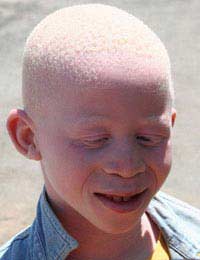Eye Tests and Diagnosing Albinism

Albinism is an inherited trait. People who are albinos have a mutation in the gene that codes for the pigment melanin. This pigment is responsible for hair, eye and skin colour, so the classically recognised albino has pale pink eyes, white hair and very pale skin.
Although this is true, there is a range of different types of albinism in which there may be some pigment and it can be localised in different places in the eyes, skin or hair. Some people who are albino may not realise it because they have blue, hazel or even brown eyes, blonde hair and pale skin, which is not really that unusual. The problem is that their skin does not have enough melanin to protect against sun damage, so any exposure to sun, on a holiday for example, has the potential to cause serious skin and eye damage.
Albinism and the Eyes
Most types of albinism affect the whole body but there are rare types that only affect the eyes. Someone with this condition is said to have ocular albinism. The genetic mutation responsible is in a gene that codes for the enzyme tyrokinase. This enzyme acts on the amino acid tyrosine and converts it into a pigment molecule. Without the working enzyme, no pigment is made. In ocular albinism, the gene is altered in such a way than melanin production is not stopped completely; small amounts of pigment are made, so there can be some eye colour.Unfortunately, albinism, whatever its effects on the appearance of the eyes, skin and hair, always changes the way that they eyes work. People with albinism always have poor vision and an eye test is now used as the main diagnostic method to identify people who may be albinos.
The mutation in the pigment gene also affects the way that the retina develops when a baby is growing in the womb. Most people with albinism have vision problems that can’t be helped by glasses or contact lenses and many are classed as legally blind. Their retina does not have the right nerve connections with the optic nerve and brain, so their vision will never improve.
What About a Genetic Test for Albinism
Although we know which gene is involved in albinism, the way that gene interacts with others makes a genetic test quite difficult. Even when parents have a child that is definitely diagnosed with albinism, analysis of their DNA often fails to show the source of the mutation. There seems to be some protective effect from the X chromosome, so boys tend to be more severely affected by albinism as they only have one X chromosome. The only way to test if subsequent children of parents with one albino child will also be affected is to do a genetic test on the baby, once born, or using cells taken from the amniotic fluid.What Eye Problems Do Albinos Have?
Genetic testing and amniocentesis does provide the information that might suggest to some parents that they terminate the pregnancy. Although the visual defects in people with albinism can be serious, albinos manage to overcome them very well and lead active lives. They can have treatment for a lazy eye, they can use tinted glasses to protect their eyes from glare and they can sometimes be helped by aids such as magnifiers.Protecting the Skin
The main problem faced by people with albinism involves avoiding exposure to the Sun over the course of their life. This condition is not one that usually reduces life expectancy – this is certainly true in temperate climates such as northern Europe. However, albinism can occur in any race and anywhere in the world and in sub-tropical regions, exposure to sunlight is much more difficult to avoid, particularly in resource-poor communities. Skin cancer and skin damage can then become a heightened risk.- What Are Photoreceptors?
- The Latest Eye Tests
- What Does it Mean to Be Legally Blind?
- Colour Vision: What Employers Need to Know
- What Makes Colour Vision Possible?
- Questionnaire: Do I Need an Eye Test?
- Night Blindness Explained
- Computer Vision Syndrome
- Night Vision
- Driving and Eyesight
- Living with Low Vision


Re: Contact Lens Trials Explained
Hi, I just visited eyehelp.co.uk and wondered if you'd ever thought about having an engaging video to explain what you…
Re: Is There an Operation for 'Lazy Eye'?
written on the parchment was scratched out
Re: What is Vitrectomy Surgery?
I had vitrectomy 4 weeks ago. The surgery was not well done as apparently bleeding occurred. The hole did not close despite having…
Re: Glasses or Contacts?
I need a eye exam and new glasses it's been since 2013/ I have no income I lost my boyfriend last September and I've been homeless ever…
Re: Eyewear for the Partially Sighted
This extract from your text is not clear and the grammar is poor- and the letters in the validation box are mixed…
Re: Eye Cancer Symptoms
I have yellow in both eyes lools like 2 dots. But looks like its makin the white part of my eye yellow whats wrong with me
Re: Are my Glasses Affecting my Eyes?
Hi, Please can anyone give advice on wearing varifocals. After a short while I develop a severe ache in my left eye and…
Re: Are my Glasses Affecting my Eyes?
On wearing my new varifocals, I am finding that my left eyeball hurts so much it feels like it will explode after 15…
Re: What is the Cause of my Itchy Eye?
I have One and only One itchy eye that has been going on 24/7 for 5 weeks.Eye is not swollen vision not affected. Eye doc…
Re: Contact Lens Trials Explained
Hi, We wanted to get in touch with you to increase traffic on your website. Please reply to this email so we can send you free…